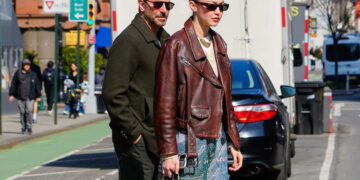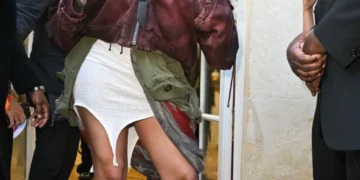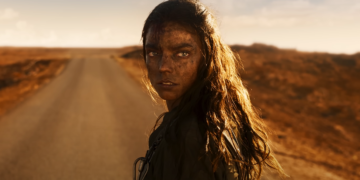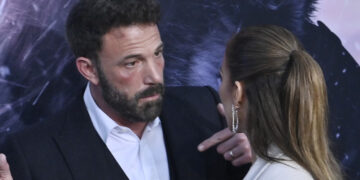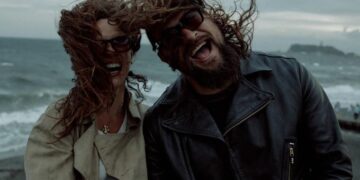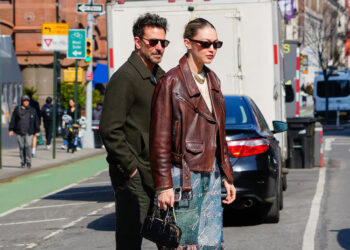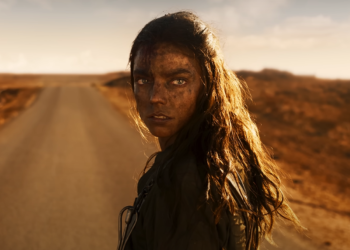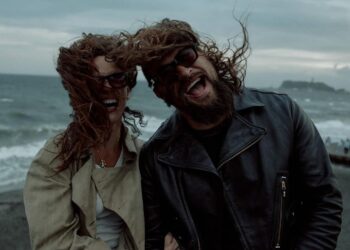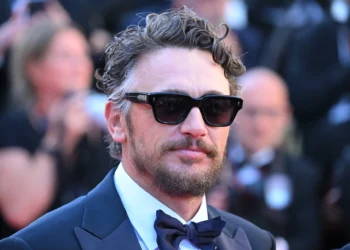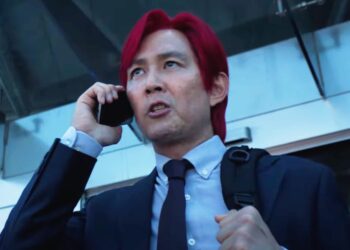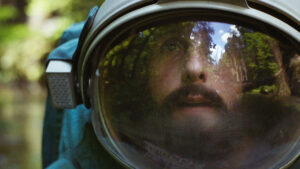
Adam Sandler is widely recognized for oscillating between two distinct modes: his trademark zany, crowd-pleasing comedy and the poignant, bittersweet performances he delivers in dramas such as Uncut Gems, Punch-Drunk Love, or Men, Women & Children. However, his upcoming Netflix film, Spaceman, presents a challenge in categorization.
Set to premiere at the Berlinale film festival on February 21 before landing on the streaming platform on March 1, Spaceman features Sandler in the role of Jakub, a Czech astronaut embarking on a solitary journey to the outer reaches of the solar system. Joining him is Paul Dano (known for The Fablemans and The Batman), portraying a sizable, multi-limbed extraterrestrial who infiltrates Jakub’s spacecraft, peppering him with probing questions the astronaut would rather evade.
While one might anticipate Rob Schneider’s trademark appearance as a spirited mission control engineer echoing his famous catchphrase, “You can do it!” across the vast expanse of space, Spaceman diverges from such expectations. Instead, it unfolds as a surreal drama, delving into themes of solitude, avoidance, and remorse. Sandler shares with us his desire for viewers to approach the film prepared for its distinctive tone. “The trailer provides a glimpse into the movie’s atmosphere,” he explains. “I don’t think it will catch anyone off guard. Netflix is presenting it in a manner that clarifies it’s not a comedy.”
In the joint conversation, director Johan Renck—best known for helming episodes of HBO’s harrowing Chernobyl and music videos for Beyoncé, Lana Del Rey, and David Bowie—is somewhat less certain that the movie will be automatically received as intended. “You can go, ‘Well, look at Punch-Drunk Love and look at Uncut Gems, or Funny People,’” Renck says. “But the truth of the matter is many of those films that I just mentioned still have a sense of humor to them to some extent. And this one does not.”
There are some moments of lightness in Spaceman, but they’re fleeting. The otherworldly arachnid voiced by Dano develops an affection for the chocolate hazelnut spread that Jakub has in his supplies (“Is this how your kind treats its feelings of loneliness?” he asks). Mostly, however, their exchanges are more like therapy, with the spider-like analyst nudging Sandler’s character to confront previously unspoken heartaches. “You might just get pissed off, like, ‘Hey, I was hoping for some funny Sandman sh*t here!’” Renck says. “But if you know from the outset, then you can go into it thinking, ‘Okay, let’s see what this is.’”
Despite the filmmaker’s concerns, Sandler still has faith that most people will catch on. “Everybody will have their own reaction,” he says. His own reaction to the first screening “was almost like a concert movie, just the feel of how it takes you away. But I have no idea what other people are going to feel.”
Sandler’s isolated experience making the movie echoed the journey of the astronaut he plays.
Many of his days were spent dangling from wires to simulate zero gravity, acting alone, often separated even from the crew—who were out of sight, operating cameras on 60-foot cranes. “I was in my own little world,” Sandler says. The alien interlocutor, who his character nicknames Hanuš, after the designer of Prague’s historic astronomical clock, was represented by the fuzzy orb that has become the go-to stand-in for visual effects creatures. “I was talking to a tennis ball a lot,” Sandler says. “But it was just a great atmosphere to go to places and try to feel the real thing.”
The film, based on the 2017 novel Spaceman of Bohemia by Jaroslav Kalfař, opens on Jakub doing a long-distance Q&A with a sixth grader who asks if, on day 189 of his trip, and 500 million kilometers from Earth, the astronaut considers himself the loneliest man alive. Jakub lies and says he communicates every day with his wife, Lenka (played by Carey Mulligan). But the secret truth is that she wants to leave him—just as she feels he abandoned her. Isabella Rossellini costars as the mission chief who is trying desperately to bring them back together before her astronaut falls apart.
Much of the movie was shot on sound stages in Long Island, which allowed Sandler to go home at the end of his solitary days. But the production moved to the Czech Republic for flashback sequences between Sandler and Mulligan, bringing Sandler far from his wife, Jackie, and their two daughters, Sunny and Sadie. That’s when he really felt the parallels between himself and the loner he was playing. “I think it naturally happens, where you just say, ‘Man, I miss home,’” Sandler says. “When you’re running around, when you’re making movies, you’re getting to be a lucky human being. It’s loads of fun, but to be away…it hurts. It hurts to wake up without your family.”
That goes for his extended family as well. One hallmark of Sandler’s Happy Madison comedies is that, from the actors to the crew, they are made by a team comprised of many of his closest friends. “When we were shooting in the Czech Republic, it’s a different time zone. Everybody’s off. You’re not living the same life you do when you’re at home. So I yearn for that. If it’s way too long, I start losing it,” Sandler says.
All Jakub wants is for his wife to answer his calls. Sometimes that’s all Sandler wanted, as well. He would phone home for inspiration before filming Jakub’s most emotionally raw moments. “My wife, I would call her up and tell her what scene I was about to do,” he says. “We would discuss things to get me into these certain places and…sh*t, man, it was deep. It wasn’t too many days where I left my trailer going, ‘Oh, this is going to be an easy scene.’ I was walking to the set going, ‘All right, here we go, man. Let’s feel it.’”
Renck describes the experience as even more isolating than Sandler remembers. “When we came to the Czech Republic and we’re shooting scenes with Carey and Adam on the ground, with no fuc*ing wires, or anything like that, it was like night and day,” the filmmaker says. “We spent two months in the studio in Long Island, and then we were in beautiful nature in the summer out in the open air—with people.”
One of the comforts Jakub enjoys on his isolated journey is a recording of Rusalka, the 1901 opera by Antonín Dvořák about a water nymph who falls in love with a mortal man. Hanuš prompts the astronaut to remember when they attended a costume party as a young couple; she was dressed as the fairy-tale figure, and he was in a makeshift space suit.
Some of Jakub’s visions find him standing in a serene forest, knee-deep in a glistening stream while Mulligan is perched nearby—a vision of natural beauty. But he is still encased in his space suit, a moveable wall that keeps him alone even when his wife is only a few feet away.
This is the theme of Spaceman, repeated throughout the story. “I actually dreamt that scene and that’s why it’s in the film,” Renck says. “That’s an embodiment of Jakub’s situation in general. He has chosen to encapsulate himself from the beauty of life and everything in order to service his own thirst, whether it’s curiosity or versions of success.”
Sandler sees it as a cautionary tale, especially for those who endeavor to push themselves to accomplish difficult or challenging ambitions. “You’ve got to be open. To make a relationship work, you definitely have to have a partnership,” he says. “And the character definitely is on his own, in his own world, and keeping everything to himself and just trying to get his own sh*t done. But he’s pretty unaware.”
That lack of awareness is what threatens Jakub’s mission, and the problem his alien visitor attempts to fix before it’s too late. “He’s so alone and in pain, and when you’re in pain and you’re alone, it is excruciating,” Sandler says. “You have nobody to help you get out of it.”
Sandler has always found strength in the people around him, which explains the way he frequently works. He shared an experience from the start of his marriage to Jackie, back in 2003, when another one of his most stalwart supporters was dying. “When my dad got sick, this is 20 years ago…I loved my dad so much that it killed me,” said Sandler, who later made an image of his father golfing into the logo for Happy Madison Productions.
“I was in Hawaii [filming 50 First Dates] and my dad was in Florida, and I would fly home on the weekends. It was a long flight and I couldn’t.… That anguish, that pain you have, and you just don’t know what to do, what to hold on to, what to grab, to feel. My wife came with me on every trip there and back because I would be like, ‘You’ve got to be next to me. I can’t be alone.’
“There’s this feeling you get when you’re just thinking too much, you don’t know how to let it out. That’s what my character’s going through. He’s just dealing with the agony of the relationship, he’s just thinking of the past and where sh*t went wrong and he’s got nothing to hold on to,” Sandler continued. “So Hanuš is there to just do something for him, do something, have someone to go back and forth with and have him listen, instead of just talk to himself.”
There is no easy way to deal with the most painful losses and setbacks of life, but Renck says Sandler has things figured out better than most. “Adam is very good at what he does, for instance. It’s this sort of relentless focus, but it’s time-consuming and energy-consuming and it takes you away from everything else. At some point it may or may not have ramifications in the rest of your life,” the director says.
“In my case, I’m three times married, and two of my marriages crashed and burned because I was out looking for Chopra Clouds”—the astral objects of Jakub’s obsession—“instead of actually seeing the people who were there next to me. So an important aspect for us as humans is understanding the balance. No matter how pleasurable and how much we love our job and all that, it’s never going to be more important than the true love of other human beings or a relationship or kids or families—whatever it is. It’s in our nature that we keep on burning up that stuff just in our quest to fulfill needs that we have within ourselves.”
“Wow,” Sandler says after Renck finishes. “You better quote that one.”







